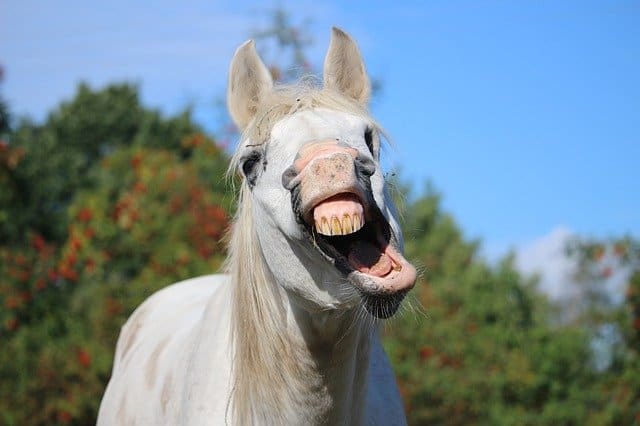Yawning, we all do it, and with humans there is definitely a contagious element. The main suggestion in humans is that yawning is linked to low oxygen levels. However, this is not always the case and researchers believe that the fact that yawning seems so contagious in people,(i.e. when your friend yawns, chances are you will probably follow suit,) that it may be linked to an ancient social interaction between groups of animals perhaps signalling a change in internal or external environments.

So why do horses yawn? Well research suggests that yawning is linked to a stress response, yawning provides the horse with some release. Both domesticated and wild horses yawn, and factors that seem to influence the frequency of yawning appear to be stress. In scientific observation of wild horses, it was found that they yawned in response to aggressive social interactions, such as stallions fighting, in fact one YouTube Video clearly shows a wild Zebra yawning in response to a predator nearby.
Why Do Horses Yawn? Check out our Video Below.
Similarly in domesticated horses that are confined to a stable yawning was more prevalent, while domesticated horses kept in an almost or close to natural environment yawned at the same rate as horses that were completely wild. This observation therefore suggests that yawning is a stress response, and a horse that exhibits the behaviour often, may have welfare issues. These issues may be related to confinement, but further investigation would be required in such cases, especially if you are worried about your horse.
Personally as I work with horses not only training, but as a Chiropractor and Deep Tissue Massage Therapist, I will often witness horses yawn, lick and chew in response to the release they get from manipulation and massage, they even lower their heads and really seem to enjoy the experience. Equally, many of the Natural Horsemanship Trainers of recent times will look for the lick and chew and even the yawn, to show the horse is relaxed and accepting in response to a question asked during training.
So Yawning does appear to be linked to a stress response, therefore, it is something to be aware of. If there has been a change in your horse or if they appear to be yawning a lot, or more than usual, perhaps start your investigation into the cause by closely observing when the animals yawns. Ask yourself if you have changed anything in the management of your horse recently? Perhaps you have changed the horse’s routine, or perhaps there has been a change in the stable environment? Whatever, the trigger for increased yawning in your horse, it can signify that the animal is stressed, so work to ensure your horse has plenty of paddock time with his friends. If you find the problem does not resolve, consult your Vet as there may be another factor involved.
Recap – Why Do Horses Yawn?
- Horses Yawn in response to a stress stimulus, such as stallions fighting in the wild or a horse kept in the stable for extended periods.
- Horses Yawn in response to stress release or tension release as when they are having manual therapy such as massage or chiropractic.
- Horses may yawn during training, such as pressure, release, as horses don’t learn from pressure but the release of pressure. As there is a release of pressure and the horses relaxes and understands he may lick and chew and even yawn during training, which can be seen during some natural horsemanship ground work.
- Horse my yawn in response to a change in their internal environments; such as with an oncoming illness.
- Always consult your Vet if you are worried about your horse.
